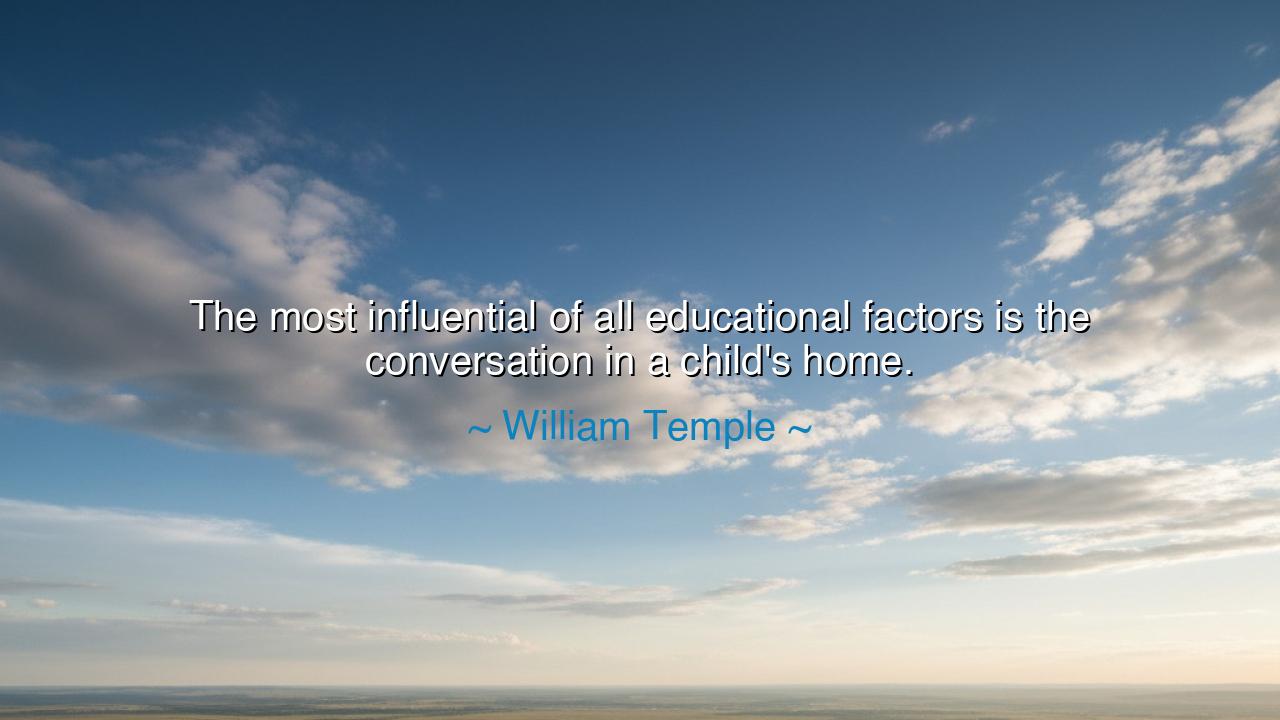
The most influential of all educational factors is the






In the wise and measured words of William Temple, the theologian, philosopher, and archbishop who sought to join faith with understanding, there is a truth as ancient as civilization itself: “The most influential of all educational factors is the conversation in a child’s home.” In this single sentence, he speaks not only of schooling or intellect, but of the sacred hearth from which all knowledge first springs—the spoken word between parent and child, between love and curiosity, between generations that build the moral and spiritual architecture of the world.
Temple, who lived in the early 20th century and devoted his life to both religion and education, understood what the ancients already knew: that education begins not in books or institutions, but in the rhythm of everyday speech—the stories told at the table, the tone in which questions are answered, the silences filled with patience or irritation. What the child hears, he becomes. The conversation that surrounds him becomes the invisible soil in which his heart and mind take root. For the young are not shaped by lectures, but by the atmosphere of meaning that breathes around them.
The philosophers of old spoke often of this truth. Plato, in his Republic, taught that the first tales told to children must be noble and good, for “the beginning is the most important part of the work.” He understood that the stories whispered in childhood shape the soul before reason can defend it. So too did Temple, standing centuries later, remind us that the home is the first and greatest school, and that parents are the first and greatest teachers—not by design, but by presence. Whether they speak in gentleness or in anger, in wisdom or in folly, every word falls like a seed upon the fertile soil of the young.
Consider the story of Abraham Lincoln, born in a rough cabin on the frontier. His formal schooling was scarce—barely a year in total—but his true education began at home. His stepmother, Sarah Bush Lincoln, spoke to him not of wealth or power, but of kindness, faith, and integrity. Her words filled his childhood with dignity and hope, even amid poverty. From her conversation, Lincoln learned compassion, perseverance, and the power of words—a power that would one day heal a fractured nation. Thus, the greatness of his mind was not born in universities, but in the quiet talk beside a hearth.
This is the force that William Temple wished to illuminate: that no system of learning, however advanced, can replace the simple and sacred exchange between souls at home. A teacher may instruct the mind, but it is the parent who instructs the heart. When a child grows up hearing words of understanding, gratitude, and love, he learns more than manners—he learns how to see the world. Likewise, when he hears only anger or neglect, his spirit carries the echo of that emptiness into adulthood. Such is the weight of every spoken word within the walls of a home.
Temple’s insight also bears a call to humility. He reminds us that the fate of nations is not decided only in parliaments or battlefields, but in kitchens and bedrooms, in the thousand small conversations that shape the conscience of the next generation. If the home becomes a place of wisdom, the world becomes peaceful. If it becomes a place of noise, the world becomes chaotic. Thus, the greatest reformers are those who teach their children to think clearly and to love deeply.
So, let this be your practice, O listener: guard your words at home. Speak to your children not only with correction, but with kindness. Tell them stories that awaken virtue. Let your table be filled with laughter, gratitude, and wonder. For every word spoken in love builds an unseen foundation in their hearts, and every silence filled with warmth teaches them how to listen.
And remember, as William Temple taught, that the most powerful school is not built of stone but of speech. Its lessons are carried not in books, but in tone, in patience, in truth. So let the conversation in your home be a daily act of creation. Through it, you will shape not only your children’s minds, but their souls—and in doing so, you will shape the destiny of generations yet to come.






AAdministratorAdministrator
Welcome, honored guests. Please leave a comment, we will respond soon